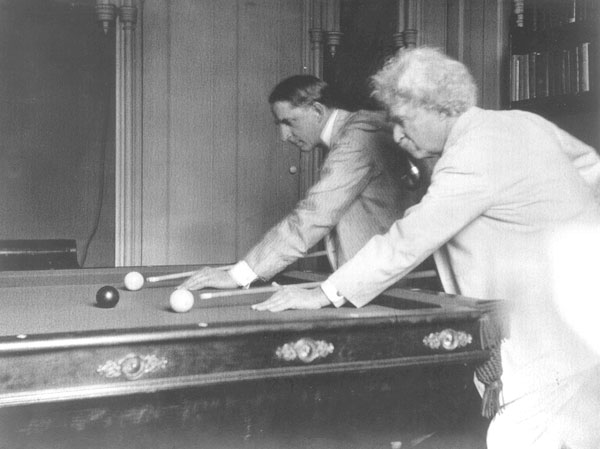Take profits on your stock positions when they have gone up. Not all new technologies are great investments. Heed the advice of technical experts. Due diligence is no substitute for “friends and family”. Some basic investment propositions that are as true today as they were 150 years ago. And Mark Twain was a pretty disastrous investor.
Some time in the 1860s he took a stock tip from his acquaintance Mr Camp, “a bold man who was always making big fortunes in ingenious speculations and losing them again in the course of six months by other speculative ingenuities”. The tip was to buy Hale and Norcross, and he purchased 50 shares at $300 a share, putting in 20% himself, with the rest on margin. He also persuaded his brother, Orion, to come in for half the amount, and awaited the cheque. Predictably enough, Hale and Norton went through the roof hitting $6,000 per share. Inexplicably Twain waited for Orion’s money before selling out. Predictably enough Hale and Norton came crashing back down. Blasted through the margin and into Twain’s equity, and “at last when I got out I was badly crippled”. Only later does Twain find out that his brother had sent the money in gold (rather than a cheque which any “normal human being” would have done) to a nearby hotel, and the clerk had deposited it in the safe and forgotten about it.
Then there was the foray into patents. Twain acquires a patent for $15,000 from an “old and particular” friend who had neglected to mention to him that it was worthless. The deal was that Twain would pay a further $500 per month to the friend who would do the manufacturing and selling. In his colourful humour Twain tells us “that raven flew out of the Ark regularly every thirty days and the dove didn’t report for duty.”
Or the steam engine, which “another old friend” told him would get out 99% of all the steam that was in a pound of coal. He takes the advice of a coal and steam expert who shows him using a book of “figures that made me drunk and dizzy” which the machine could not come within 90% of the claimed steam release. Despite the expert advice Twain proceeds and engages the inventor because “maybe the book was mistaken”. Five thousand dollars later, the inventor comes up with a machine which saved 1% steam, but “you could do it with a teakettle.” Undeterred, Twain now fancies himself as an enthusiast on steam and takes some stock in a Hartford company which is a making a new kind of steam pulley. “That pulley pulled thirty two thousand dollars out of my pocket in sixteen months, then went to pieces.”
These are just a few anecdotes from a collection of letters and notes which constitute the autobiography of Mark Twain (real name Samuel Clemens), put together from 1870 up to his death in 1910, and edited into a book by Charles Neider in 1959. He is not afraid to admit his follies, and he is not afraid to admit his vanity:
“This Autobiography of mine is a mirror and I am looking at myself in it all the time. Incidentally I notice the people that pass along at my back...and whenever they say or do anything that can help advertise me and flatter me and raise me in my own estimation I set these things down in my Autobiography.”
We learn that Twain was a highly proficient billiards and pool player. And with our modern world obsessed with level playing fields and standardised rules he gives us the story of the billiards table at Jackass Gulch, a dilapidated former mining town which the gold deposits were now exhausted. The saloon is of a “ruined and rickety character struggling for life, but doomed.” And the pool table reflected this, with chipped balls, the cloth darned and patched, the table’s surface undulated with headless cues that “had the curve of a parenthesis”. And Twain postulates that it would be much more entertaining to have the great champions who grace the competition tables of Madison Square pit their skills against Texas Tom of Jackass Gulch on the bad billiard outfit, where adjustments have to be made for all of the table’s faults and inaccuracies. Possibly some life lessons there.
And how did Twain conceive of Finn, the reckless boyhood adventurer ? Well there must have been something of the Twain about Finn. An example comes from 1845 when a measles epidemic is claiming the lives of many children in Mark Twain’s home town. The ten-year old Twain is so engulfed with impatience as to whether he will succumb to the epidemic that he forces the issue by deliberately sneaking into the house of his measles-infected friend and jumping into bed next to him. Needless to say he contracts that disease, but survives by a whisker.
The book is a fascinating insight into an America which is transforming from Emerging Market to Global Superpower (“Steadily, continuously, persistently, we are Americanizing Europe, and all in good time we shall get the job perfected”). Twain was a supporter of equality, though his language reflects what was culturally acceptable and normal in a country where slavery was still prevalent. And he was active all the way to his death. Although one suspects that if the death of his wife in Italy 1904 was a near-fatal emotional blow to him, then the loss of his daughter Jean in 1909 probably sapped his remaining will to live.
This is the Wikipedia link for the book.


 RSS Feed
RSS Feed
